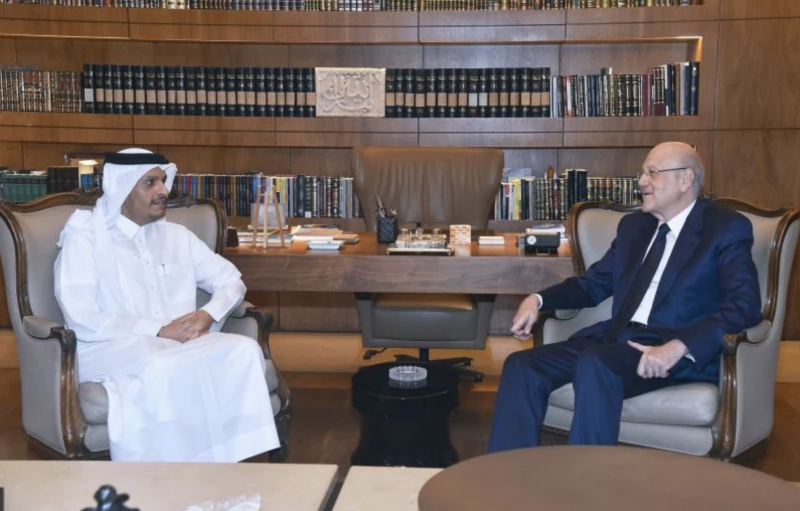
Prime Minister-designate Najib Mikati receiving Qatari diplomatic chief Sheikh Mohammad bin Abdel Rahman Al Thani on Thursday, June 30, at the Grand Serail. (Credit: Dalati and Nohra)
This is a first. After the recent flow of international humanitarian aid intended to guarantee the army’s survival, the military will now receive soldiers’ salaries from a party other than the bankrupt Lebanese state.
Qatar decided to disburse $60 million to the army as part of its support to a country devastated by the most severe economic crisis in its history.
Qatar’s top diplomat, Sheikh Mohammad bin Abdel Rahman Al Thani, who attended the recent Arab League meeting in Beirut, announced this financial aid package on July 1.
As incongruous as the donation may seem, there is no doubt it comes at the right time to allow the military to maintain order and security in a dignified manner, and address the risk of desertion looming over the institution since the economic and financial collapse began.
Exhausted by the currency depreciation, stripping the lira of more than 90 percent of its value, the army has in recent months intensified appeals to international partners.
This call for help came after the institution repeatedly warned the political class of the risks of implosion. The average soldier’s salary does not exceed $100 now, compared with $800 before 2019.
In March 2021, army commander-in-chief Gen. Joseph Aoun issued yet another ultimatum to officials tangled in infighting, indifferent to the collapse.
“What are you planning to do about the explosive situation? The army will not be anyone’s punching bag,” he said. Since then, the general has been laboring to solicit help from Arab and Western countries.
According to one military source, the Qatari aid should allow the rank and file to survive for five to six months. A rough calculation suggests the $60 million will be used to pay an average equivalent of $100 per month to 75,000 troops.
The question is what the military will do once these funds dry up. “Lebanon has no choice but to work on reforms demanded by the International Monetary Fund,” said a source who has been closely following the issue.
The IMF has promised to grant Lebanon $3 billion, provided that the government agrees to implement ambitious, but necessary reforms that the funds says will pull the country out of decline.
A US blessing
Qatari’s latest army aid initiative — Doha had already announced in-kind assistance of 70 tons of food products to the military — was welcomed by the United States, one of the the Lebanese army’s main donors. Secretary of State Antony Blinken congratulated Qatar’s top diplomat for his initiative Sunday, according to State Department spokesman Ned Price.
In September 2021, US President Joe Biden issued a memorandum to the secretary of state to clear up to $47 million in humanitarian and food aid to the Lebanese military.
With this maneuver, Biden presidential prerogatives to bypass the traditional procedure that requires that Congress green-light external aid, and speed up the disbursement process.
Unlike Qatar, which is generally more accepted by all Lebanese parties, including Hezbollah, the US administration is unable to help pay the soldiers’ salaries, though for decades it has provided military equipment, more recently humanitarian aid.
There are legal prohibitions to Washington becoming the paymaster of Lebanon’s army, and it is feared that such an initiative would anger hostile Lebanese parties, such as Hezbollah and its allies, who could argue that such funding would compromise Lebanese sovereignty.
New mediation?
It is therefore Qatar — which is increasingly establishing itself as the region’s mediator — that was best placed to take this step after several failed attempts led by the US and Saudi Arabia via the United Nations.
This needed aid for the military allows Doha to re-enter the Lebanese scene through the front door. As the only Gulf country able to maintain privileged ties with both the Americans and Iran simultaneously, especially economic ones, Qatar is in a good position to restore its role as a catalyst in the region.
Doha has taken up the mission of sponsoring indirect nuclear talks between Washington and Tehran after they stalled for three months in Vienna, and it has been working to resolve the crisis in Yemen.
Well-informed source said that the Qatari minister of foreign affairs met with senior Hezbollah officials during his last visit to Beirut.
The intercession could pave the way for a more advanced role on the Lebanese scene once the regional landscape sorts itself out, especially after a possible agreement in the Iranian nuclear file.
“It would be a conciliatory mission, in the same spirit as the one that took place in 2008, when Qatar sponsored an intra-Lebanese agreement,” said a pro-March 14 figure.
Concluded on May 21, 2008, the Doha Agreement put an end to an unprecedented political and institutional crisis in Lebanon, displacing the logic of confrontation with one of dialogue and consensus.
This article was originally published in French with L'Orient-Le Jour. Translation by Joelle El Khoury.